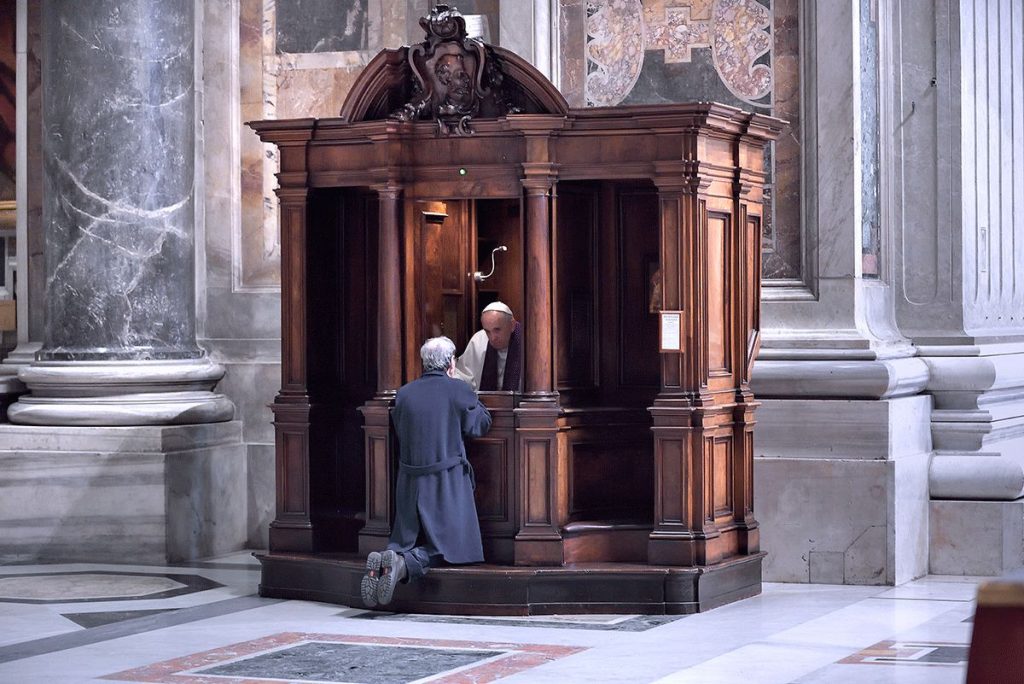I am reading Pope Francis’ new book, “The Name of God is Mercy” (Random House), which came out last week.
It is a powerful, personal work. Since the beginning of his pontificate, I have been struck by how much the pope’s vision has been shaped by his experience as a priest in the confessional.
His new book offers the reflections and insights of one who has heard thousands of confessions over many decades. It is a long mediation on the human encounter with God’s infinite mercy and the great lengths that God will go to offer his mercy, even to those who do not want to receive it.
Describing his own approach to hearing confessions, Pope Francis writes: “I always thought about myself, about my own sins, and about my need for mercy, and so I tried to forgive a great deal.”
The pope is a “realist” about sin. “The Church condemns sin because it has to relay the truth: ‘This is a sin.’”
We need God’s mercy because we are all sinners, wounded by the original sin of Adam and Eve. Without his mercy we could not survive. He quotes an old grandmother who once said to him: “If the Lord didn’t forgive everything, our world would not exist.”
But the Church is called to be humble and merciful in condemning sin, the Pope explains. No one in the Church has reason to feel superior, he writes. “The more conscious we are of our wretchedness and our sins, the more we experience the love and infinite mercy of God among us, the more capable we are of looking upon the many ‘wounded’ we meet along the way with acceptance and mercy.”
While reading the pope’s book, I’ve also been preparing for our second annual OneLife LA procession and festival on Saturday, Jan. 23. This is going to be a great day of hope and renewal in which we celebrate the Church’s beautiful vision for our lives and our society. So I hope to see all of you there, especially our young people from our parishes and schools.
As I see it, OneLife LA is an expression of the Church’s traditional spiritual works of mercy.
The first three of the Church’s spiritual works of mercy — to counsel the doubtful, to instruct those who do not know, and to admonish the sinner — are all a call to conversion.
Through these spiritual works of mercy, the Church invites us to examine our conscience and to open our hearts to the demands of the Gospel.
I think about these spiritual works as part of the Church’s prophetic mission — to shine the light of Christ into the darkest areas of our society and our lives, the places we would prefer not to think about.
This is what the Church has been doing on the subject of abortion since 1973 when the Supreme Court legalized the practice in the case of Roe v. Wade. OneLife LA is timed to remember this tragic day in our nation’s history, and to call us to a new appreciation of the dignity and sanctity of human life. That is why we OneLife LA this year will be followed by our annual Requiem Mass for the Unborn.
We condemn abortion and also euthanasia and assisted suicide because it is the direct killing of innocent human life. As Pope Francis has said: “It is not licit to eliminate a human life to solve a problem. … [It is] a sin against God the Creator: think hard about this.”
The spiritual works of criticizing the sinner and instructing those who do not know are not about “rules” or saying “no.” It is about justice and dignity for the human person. These sins in our society are not wrong because they break a Church “rule.” They are wrong because they deny others their God-given rights. In God’s plan for creation, there is no situation in which it is right to sacrifice the life of one who is weaker for the benefit of one who is stronger.
The Church does not dwell on what is wrong. We want to attract people to what is right. That’s what we’re doing at OneLife LA. This day is one long celebration of God’s beautiful vision for creation and for human life.
So let’s pray for one another this week — and for the success of OneLife LA. May this spiritual work of mercy help bring about a revival of compassion and mercy in our society, so that we can build a culture of life that cares for others, especially those who can’t take care of themselves.
And may our Blessed Mother Mary help all of us in the Church to be workers of mercy, turning people away from sin and injustice and opening their eyes and hearts to God’s plan.
You can follow Archbishop Gomez daily via Facebook, Twitter and Instagram.

